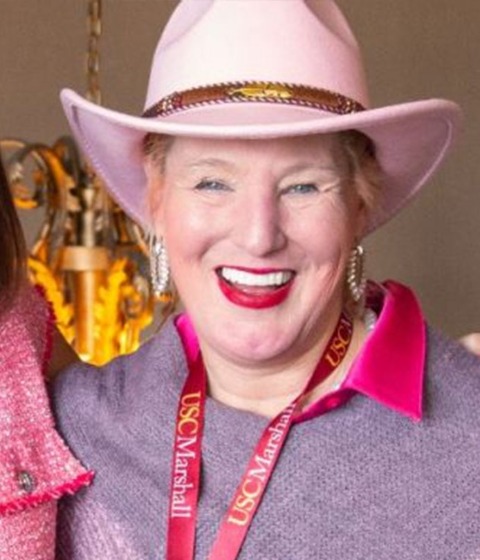
Cited: Emily Nix in Financial Times
The Financial Times cites Nix’s study that shows women suffer earnings and employment falls after cohabitating with an abusive partner.
Social Entrepreneurship: A Vision for Future Changemakers
Social Entrepreneurship: A Vision for Future Changemakers
Global researchers, students and practitioners convene at the 19th Annual Social Entrepreneurship Conference at USC to define the next decade of social impact.

As our increasingly fast-paced, knee-jerk social media spaces have shown us over the last two decades, words and how we define them matter. No one knows this more than researchers, about 50 of whom gathered last week to discuss social entrepreneurship as a field, a movement and at a core definitional level. Co-hosted by USC Marshall Brittingham Social Enterprise Lab (BSEL) Research Director Jill Kickul and Associate Professor of Entrepreneurship at Indiana University Kelley School of Business Sophie Bacq, the event featured two days of keynotes and interactive paper presentations on various topics including diversity, value measurement, collective action, stakeholder engagement, B corps and more.
Said Kickul, professor of social entrepreneurship at the Lloyd Greif Center for Entrepreneurial Studies at USC Marshall School of Business: “It was wonderful to be back in person, debating and discussing with scholars from all over the world, who are contributing to the ongoing development of theory and research on social entrepreneurship and its impact on society.”
Practical Research
Kicking off the conference, Lisa Hehenberger, director of the Esade Center for Social Impact, discussed social entrepreneurship research from an insider’s perspective. “We are often accused as academics of being stuck in our ivory towers and not understanding what is happening on the ground,” she said. “As an insider immersed in the field, you have an incredible depth of understanding of the phenomenon of study and amazing access to data in various formats.”
Hehenberger emphasized the question of a researcher’s role and how to better connect it with practical applications: how can a researcher help a company achieve its goals?
“It was wonderful to be back in person, debating and discussing with scholars from all over the world, who are contributing to the ongoing development of theory and research on social entrepreneurship and its impact on society.”
— Jill Kickul, Professor of Social Entrepreneurship
All in a Definition
At the root of discussions over the two-days was the subject of defining key terms in the field including social innovation, intentionality and, yes, social entrepreneurship itself. In a presentation by Sophie Bacq and Tom Lumpkin, visiting senior research associate in the Haslam College of Business at The University of Tennessee, Knoxville, and professor emeritus of entrepreneurship at the University of Oklahoma, the question of whether social entrepreneurship itself needs to be redefined to more accurately reflect what it is today was discussed.
Said Lumpkin: “Definitions from the earlier years of the field are about to be outdated and we need a new conversation on this. What defines social entrepreneurship is an entrepreneur’s pursuit of social and environmental impact. But many researchers retreat from defining what makes a social difference. We contend that what makes a social difference is empowerment.”
Bacq shared their proposed three-word definition of “prosocial economic empowerment,” where “prosocial” refers to the entrepreneur’s intentionality, “economic” refers to the reliance on market-based activity and commerce, and “empowerment” is about strengthening capabilities, improving well-being, and regaining agency of beneficiaries. “By zeroing-in on a clearer definition of social entrepreneurship, we’re providing researchers with normative content, setting boundaries and focusing on a narrower set of outcomes to measure,” she said.
In a closing keynote, Christine Beckman, Price Family Chair of Social Innovation at the USC Sol Price School of Public Policy, proposed broadening, instead of narrowing, definitions. “We should be thinking about social enterprise, social entrepreneurship and social innovation as part of the same thing,” she said.
Who is at Stake?
If you’ve read a mission statement or even a social media post in recent months, you know that organizations are quick to include the “DEI” clause among their core messaging and values. But very few seem to have fully processed or integrated what it means to promote DEI from an everyday perspective. The topic of inclusivity, from the perspective both of social impact beneficiaries and social entrepreneurs, compelled researchers at the conference to consider different approaches to products, profitability and legitimacy for social entrepreneurs and social enterprises.
Christine Mehelcic, assistant professor of management at University of Richmond Robins School of Business, spoke about how social entrepreneurs are managing stigma associated with a disability, detailing the many complexities associated with businesses providing solutions for these beneficiaries. “Some beneficiaries may feel empowered by their disability, but others might not want to be labeled,” she said.
Garnering legitimacy among social beneficiaries was also a recurring theme. While some of the early discussion discussed why partnership is important, others discussed how trust and credibility of one’s work in the eyes of one’s beneficiaries is the difference between a viable solution being adopted versus discarded.
Researchers and academics convened at the conference also discussed the conversations that need to happen at the founder level. Diversity, equity and inclusion is great as a concept, but in practice, social entrepreneurs from minority backgrounds have yet to see equal opportunities in terms of funding support. Black female founders received only 0.2% of funding deals between 2012 and 2014. The average amount these enterprises were able to raise was $36K, compared to startups founded by a white male founder average of $1.3 million in venture funding. This number has only nominally increased in the last decade, said Thema Monroe-White, assistant professor of data analytics at Berry College.
Looking at these gaps in funding, particularly given how focused Black female founders statistically seek and emphasize social impact over economic impact, Monroe-White said it's worth more closely studying these inequities and including such considerations in prevailing social entrepreneurship literature. “Recognizing the gap and finding a way to close the gap is a motivator,” she said. “If parity were achieved—and minority women-owned firms matched that of white women-owned businesses, four million new jobs and $981 billion in revenue would be created.”
Stakeholders and Beneficiaries
Social entrepreneurs know that best intentions do not always result in desired outcomes. The disconnect between who is designing a program or product and who is benefiting from it could be addressed by a closer relationship between stakeholders and beneficiaries, Lumpkin said.
Hehenberger shared a similar sentiment. “Impact investors are not in direct touch with the social beneficiaries of their investment and they don’t often include the voices of these beneficiaries in their work,” she said. “If you’re not having an impact on these beneficiaries, what is the point of impact investment?”
Looking into the next decade of social entrepreneurship, the academics and researchers convened suggested better aligning and understanding value propositions across stakeholder bodies and more clearly understanding how to measure whether or not intentions match up with outcomes will create even stronger new partnerships and deeper work in effecting long-term sustainable change.
Solid Progress and New Themes
Said Bacq: “Social entrepreneurship research has come a long way since the field’s inception. Reflecting on the evolution over the past twelve years since co-directing this conference with Jill, I can say that we have made huge progress in terms of both research depth and relevance. It is our intention to keep engaging with practice and to keep serving as a key platform at the forefront of social entrepreneurship research.”
The 19th Annual Social Entrepreneurship Conference was held November 11-12 and convened global social entrepreneurship researchers, academics and practitioners around core topics including measurement of impact, diversity and inclusion in social entrepreneurship, stakeholder engagement, and more. This is the largest gathering of its kind in terms of research submissions. This year’s gathering introduced four new topic areas including: stigmatization, marginalization and emancipation; communal and collective aspects of social entrepreneurship; incubators and ecosystems perspectives on social entrepreneurship and value capture and value sharing in social entrepreneurship.
The conference was sponsored by University of Southern California Marshall School of Business, Greif Center for Entrepreneurial Studies, Brittingham Social Enterprise Lab, and Indiana University Kelley School of Business, Johnson Center for Entrepreneurship & Innovation.
RELATED
Cited: Emily Nix in Financial Times
The Financial Times cites Nix’s study that shows women suffer earnings and employment falls after cohabitating with an abusive partner.
Knight Foundation and USC Marshall Commit $4 Million to Advance Purpose-Driven AI Research
The research initiative aims to create ethical, human-forward outcomes for cutting-edge technology like AI.
Cited: Shon Hiatt in E&E News
Google, NextEra strike deal to restart Iowa nuclear plant
Cited: Shon Hiatt in The Wall Street Journal
Energy & Utilities Roundup: Market Talk